#howard johnsons motor lodge
Photo


David Gilmour - Pink Floyd, Howard Johnsons Motor Lodge NYC 4-9-70 Fillmore East, Manhattan, New York City. © Thom Lukas.
#david gilmour#pink floyd#howard johnsons motor lodge#manhattan#fillmore east#april 1970#1970#my edit
157 notes
·
View notes
Text
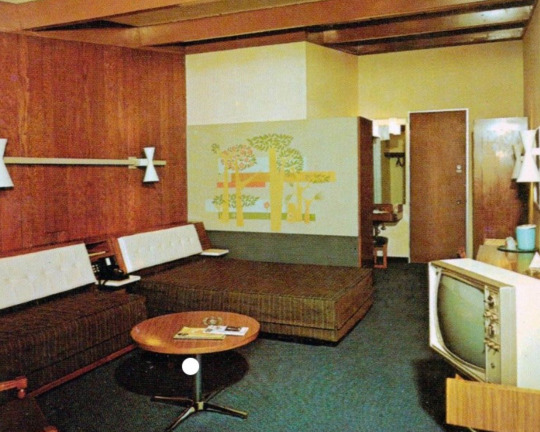
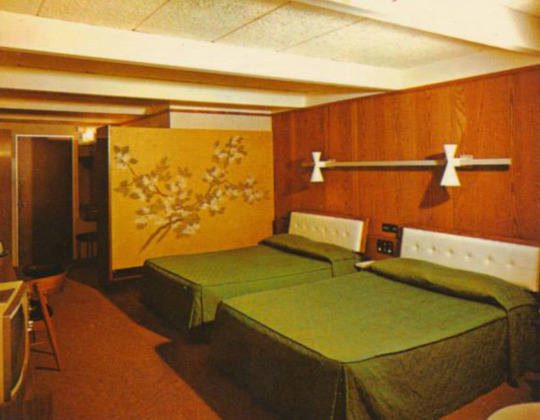
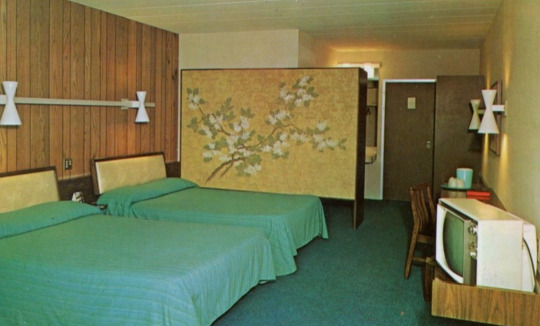


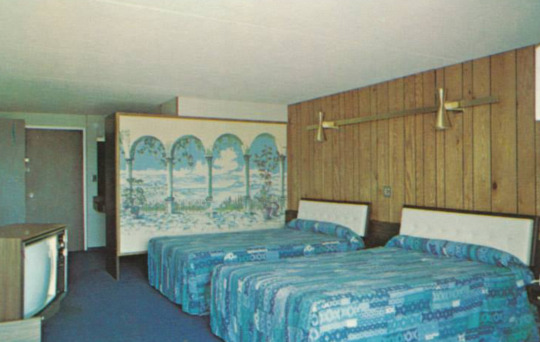

711 notes
·
View notes
Text
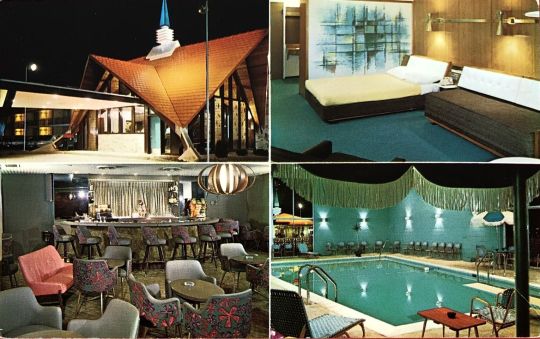
1963 Howard Johnson's Motor Lodge and Restaurant Council Bluffs, Iowa
8 notes
·
View notes
Text
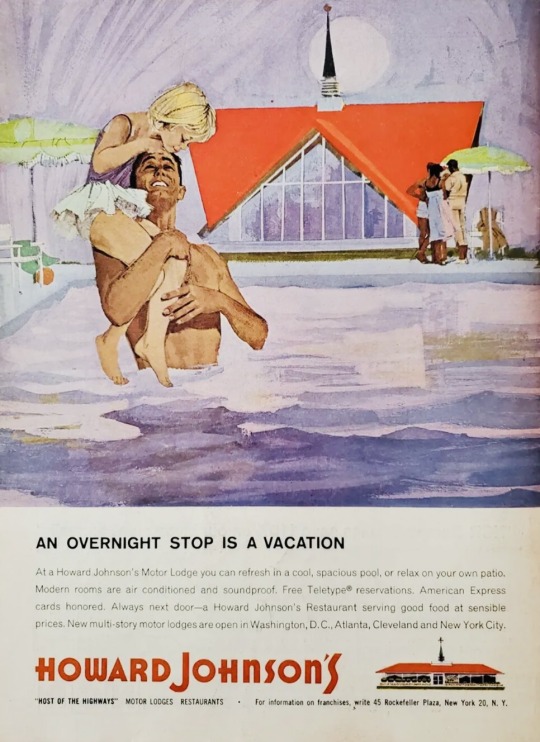
1963 Howard Johnson’s Motor Lodge
#1963#60s vintage#60s advertising#howard johnson#motor lodge#hotel#motel#hojo#vintageadsmakemehappy#vintage magazine#vintage advertising#magazine#advertising#1960s#60s
69 notes
·
View notes
Text

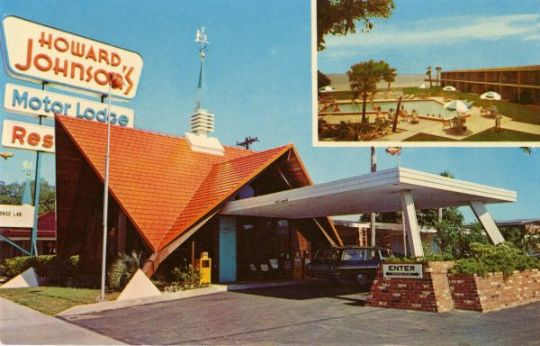
Retro: Howard Johnson’s Motor Lodge & Restaurant in Florida ❤️🧡
Pensacola 🥤 + Panama City 🌆
📸 Florida Backroads Travel
📸 Florida Memory
I’ve always wanted to go to a HOJO! 🥰 Unfortunately, the last remaining HOJO in Lake George, New York closed in 2022. 💔 HOJO was once America’s largest restaurant chain. 💘
Thanks for the inspiration, @deadmotelsusa! 🪽 Anyone who’s into motels, the motel aesthetic, or even just old buildings/architecture in general should TOTALLY follow your blog. 💖
#howard johnson#howard iohnson’s#motor lodge#restaurant#motels#motel aesthetic#motel sign#retro signs#old sign#retro aesthetic#60s nostalgia#nostalgia#doelette#doelet#nymphett#retro design#retro buildings#americana#florida#hojo
1 note
·
View note
Text

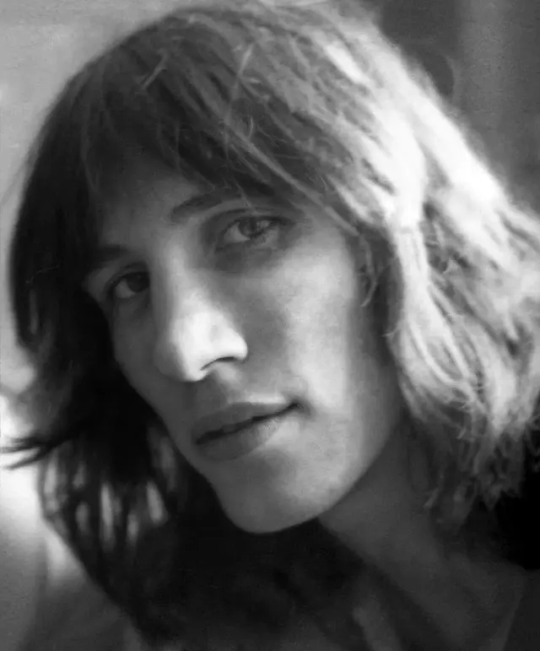
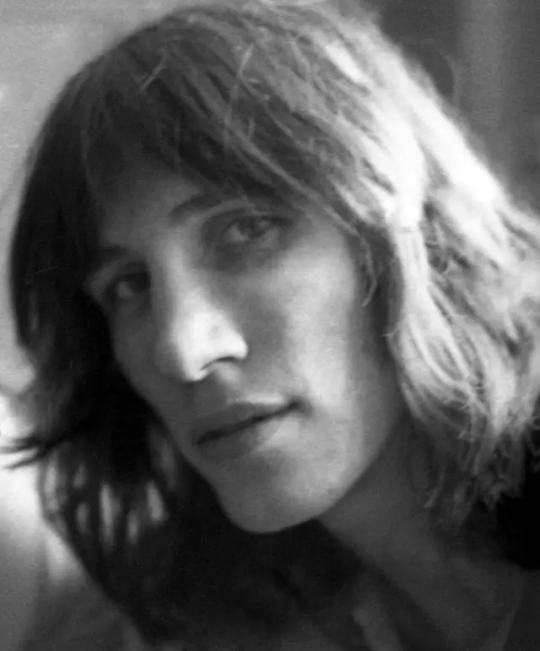
Roger Waters at Howard Johnsons Motor Lodge NYC September 4th 1970
47 notes
·
View notes
Text
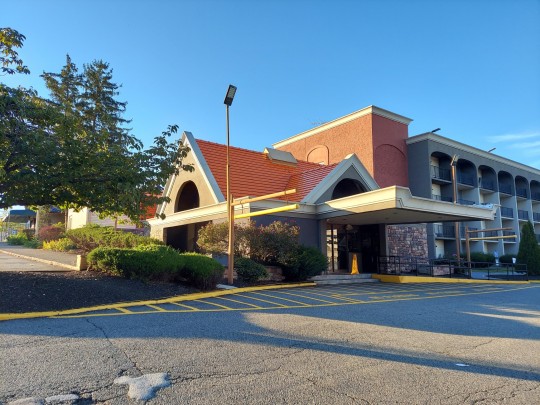

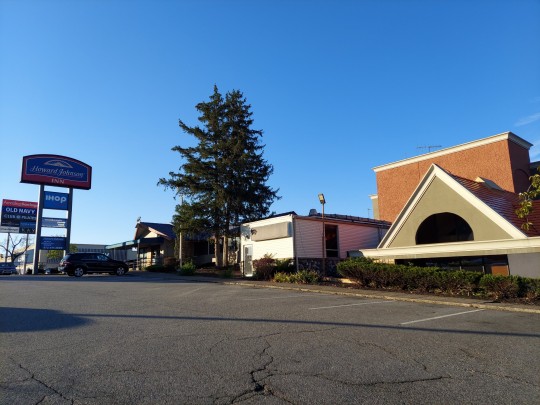

Welcome to Howard Johnson's Motor Lodge! The one that looks shitty is in York, PA, currently operating as a different motel that tried and failed to paint over the iconic HoJo orange roof. The other three pictures are a rare original Howard Johnson in East Rutherford, NJ, that still operates as a HoJo to this day.
38 notes
·
View notes
Text

Rick Wright photographed in 1970 at the Howard Johnson Motor Lodge in Manhattan, New York by Thom Lukas. 🎧
63 notes
·
View notes
Text

David Gilmour - Pink Floyd, Howard Johnsons Motor Lodge NYC 4-9-70 Fillmore East, Manhattan, New York City.
11 notes
·
View notes
Text
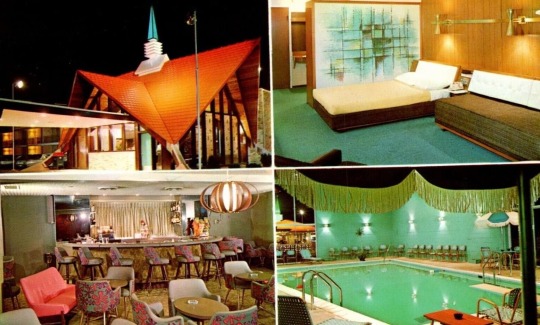
«Howard Johnson's Motor Lodge & Restaurant. 36th St & W Broadway. Council Bluffs, IA
"4 minutes to downtown Omaha and downtown Council Bluffs. Rooms air-conditioned. Direct phone dialing. Free TV and FM radio. Heated enclosed swimming pool for year around enjoyment. Conference rooms. Cocktail lounge. Patios, balconies, executive suite."»
2 notes
·
View notes
Photo

Rick Wright Pink Floyd, Howard Johnsons Motor Lodge NYC 4-9-70 Fillmore East, Manhattan New York City. Photo by Thom Lukas.
254 notes
·
View notes
Text
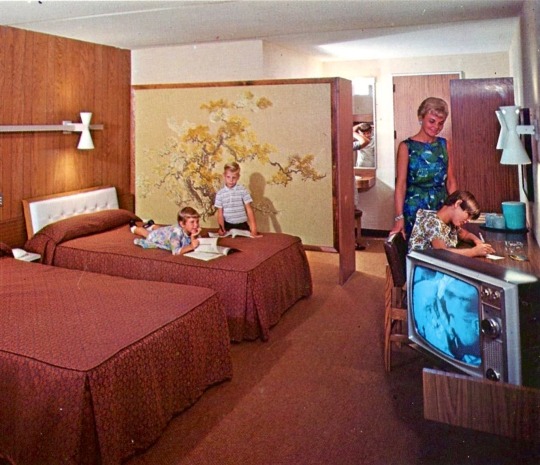
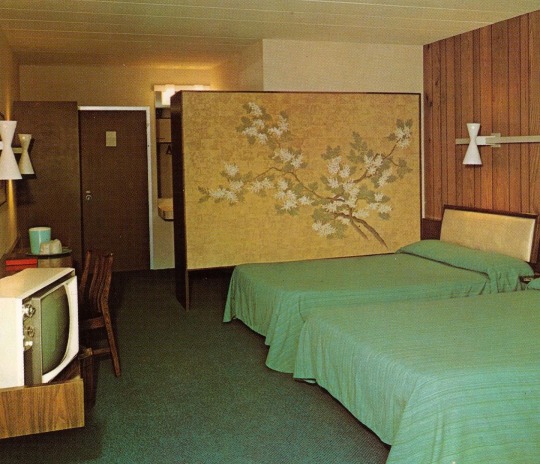
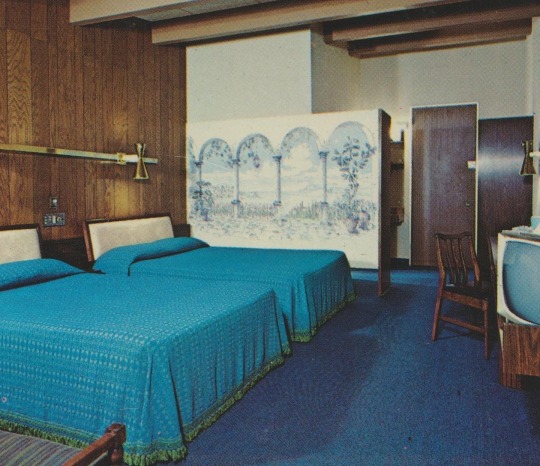
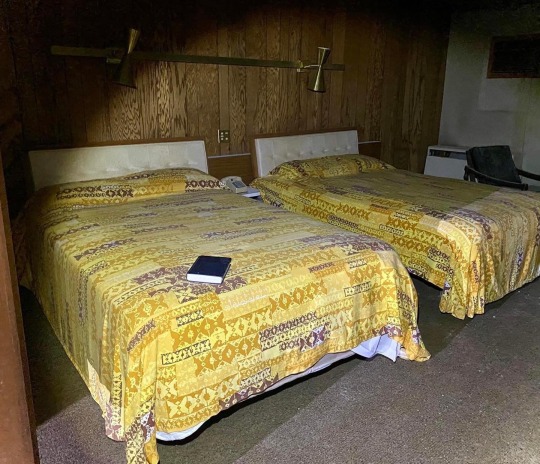

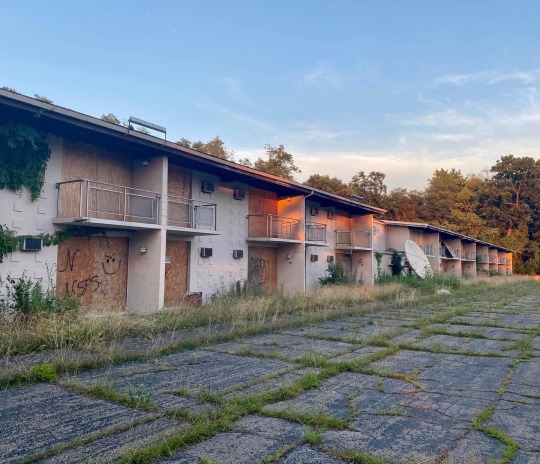

Somewhere in America, a Howard Johnson Motor Lodge sits untouched.
Behind a chain link fence, down an overgrown driveway, beyond the plywood covered doors, each room is fully furnished and stuck in time. Many of the original midcentury features remain, including the distinct HOJO light fixtures, headboards and wall dividers.
The A-framed Gate Lodge is also still there. The orange roof and blue spire are slightly visible from the road. While passing, you would have to look up at the perfect moment to even catch a glimpse of it. Most people drive right by, having no idea what’s been abandoned back there for the last 40 years.
751 notes
·
View notes
Text
HEATHER COX RICHARDSON
July 2, 2022 (Saturday)
Summer 1964 was known as the “Freedom Summer.”
Americans, Black and white, southern and northern, eager to defend the right of all Americans to vote, planned to register Black people for the upcoming election. Because only 6.7% of Black Mississippians were registered, Mississippi became a focal point. Under Bob Moses, a New York City teacher who began voting work in Mississippi in 1961, volunteers set out. Just as they were getting underway, on June 21, three voting rights workers, James Chaney, Andrew Goodman, and Michael Schwerner, disappeared near Philadelphia, Mississippi.
No one knew where they had gone, but although some white people tried to argue they had chosen to disappear simply to call attention to their cause, no one with a grip on reality in that racially charged era imagined they had gone anywhere good.
President Lyndon B. Johnson, who as Senate majority leader had wrestled the Civil Rights Act of 1957 through Congress, was determined to pass the stronger civil rights bill his predecessor President John F. Kennedy had advocated in 1963. Indeed, just five days after Kennedy’s murder, Johnson had told Congress: "No memorial oration or eulogy could more eloquently honor President Kennedy's memory than the earliest possible passage of the civil rights bill for which he fought so long.”
Southern white men passionately defended their right to rule over their Black neighbors through state legislation, but Johnson, for all that he hailed from Texas, wanted none of that. "We have talked long enough in this country about equal rights. We have talked for one hundred years or more. It is time now to write the next chapter, and to write it in the books of law."
The House of Representatives had been considering a civil rights bill since June 1963 but had left for winter recess without its being moved out of the Rules Committee, where the chair, staunch segregationist Howard Smith (D-VA), bottled it up. During the recess, so many congressmen heard from constituents angry the bill hadn’t passed that Smith backed down and let it out of committee. The House passed the bill on February 10 and sent it on to the Senate, where everyone knew the southern segregationists would not give up easily.
And they didn’t. The Senate began to debate the bill on March 30, and southern Democrats launched a filibuster. In those days before the Senate rules change, filibusters required that senators actually hold the floor to talk a bill to death, so they made up squads of senators who rested and spoke in teams. The head of the southern bloc, Richard Russell (D-GA), said: “We will resist to the bitter end any measure or any movement which would have a tendency to bring about social equality and intermingling and amalgamation of the races in our states.”
Meanwhile, the northern Democrats in favor of the bill held their own. At stake were the votes of those Republicans who liked the idea of civil rights in principle but didn’t want to increase the power of the government, whose business regulation they opposed.
As the spring wore on, Black people and their white neighbors demonstrated their support for civil rights by integrating formerly segregated spaces, while opponents of the bill attacked them. On June 18, when Black and white people jumped into a whites-only swimming pool at the Monson Motor Lodge in St. Augustine, Florida, the hotel’s owner, James Brock, poured acid into the pool. While the water diluted the acid enough that the swimmers were not injured, law enforcement arrested them. News crews covered the incident. Seeing a white man pour acid into a swimming pool to drive out Black people was the last straw.
The next day, Republican Everett Dirksen (R-IL), the Senate minority leader, managed to deliver enough Republican votes to Senate Majority Leader Mike Mansfield (D-MT) to break the filibuster. Arizona Senator Barry Goldwater, who said, “I am unalterably opposed to discrimination or segregation on the basis of race, color or creed, or on any other basis,” voted against ending the filibuster, saying he believed it was “a grave threat to the very essence of our basic system of government, namely, that of a constitutional republic in which 50 sovereign states have reserved to themselves and to the people those powers not specifically granted to the central or Federal Government.”
The Senate passed the bill on June 19 and sent their version back to the House. Meanwhile, rage over the three missing voting rights workers grew, and Johnson used that anger to pressure the House to pass the bill.
It did. Johnson signed the Civil Rights Act of 1964 into law on July 2.Just before he wrote his name, Johnson addressed the American people on television “to talk to you about what that law means to every American.”
Keenly aware of the bill’s timing, he noted: “One hundred and eighty-eight years ago this week, a small band of valiant men began a long struggle for freedom. They pledged their lives, their fortunes, and their sacred honor not only to found a nation, but to forge an ideal of freedom—not only for political independence, but for personal liberty; not only to eliminate foreign rule, but to establish the rule of justice in the affairs of men.”
That was a triumph, but “those who founded our country knew that freedom would be secure only if each generation fought to renew and enlarge its meaning…. Americans of every race and color have died in battle to protect our freedom. Americans of every race and color have worked to build a nation of widening opportunities. Now our generation of Americans has been called on to continue the unending search for justice within our own borders.”
Johnson celebrated that the bill had bipartisan support of more than two thirds of the lawmakers in Congress and that it enjoyed the support of “the great majority of the American people.”
“The purpose of the law is simple. It does not restrict the freedom of any American, so long as he respects the rights of others. It does not give special treatment to any citizen…. It does say that…those who are equal before God shall now also be equal in the polling booths, in the classrooms, in the factories, and in hotels, restaurants, movie theaters, and other places that provide service to the public.”
“Its purpose is not to punish. Its purpose is not to divide, but to end divisions—divisions which have lasted all too long. Its purpose is national, not regional. Its purpose is to promote a more abiding commitment to freedom, a more constant pursuit of justice, and a deeper respect for human dignity.”
“We will achieve these goals because most Americans are law-abiding citizens who want to do what is right,” he said. “My fellow citizens, we have come now to a time of testing. We must not fail.”
It was indeed a time of testing. When the American people came together to push Congress to pass the Civil Rights Act of 1964, opponents of it saw a call to arms. Two weeks after Johnson signed the bill, a little more than three weeks after Chaney, Goodman, and Schwerner disappeared and while they were still missing, Goldwater strode across the stage at the Republican National Convention to accept the nomination. On July 16, he told delegates that “extremism in the defense of liberty is no vice. And…moderation in the pursuit of justice is no virtue.” The votes of the delegates from South Carolina were the ones that put him over the top for the nomination.
On August 4, the U.S. had a powerful example of what certain Americans thought of as "extremism in the defense of liberty" when the missing bodies were found buried in an earthen dam near Philadelphia, Mississippi, and it turned out that Ku Klux Klan members, at least one of whom was a law enforcement officer, had murdered them.
Voters in the 1964 election continued to back Johnson’s vision of the world, rejecting Goldwater by a landslide. And those voters perhaps took false hope that their will had triumphed when Goldwater won only his own state of Arizona and five states of the Deep South—Louisiana, Mississippi, Alabama, Georgia, and South Carolina. They didn’t see there was a shift underway that would transform first the Republican Party, and then the nation itself.
1 note
·
View note
Text
Best Western in Haverhill Closing to Make Way for New Hotel; Building was Built as Howard Johnson’s
Best Western in Haverhill Closing to Make Way for New Hotel; Building was Built as Howard Johnson’s
(Additional photograph below.)
It was one of the first new buildings in Haverhill to take advantage of the new Interstate 495 highway during the early 1960s, but it’s going away.
Built as the Howard Johnson’s Motor Lodge on a relocated portion of Lowell Avenue, the now Best Western closes this month to make way for a modern hotel. In a statement, owner Giri Hotel Management said Best Western…
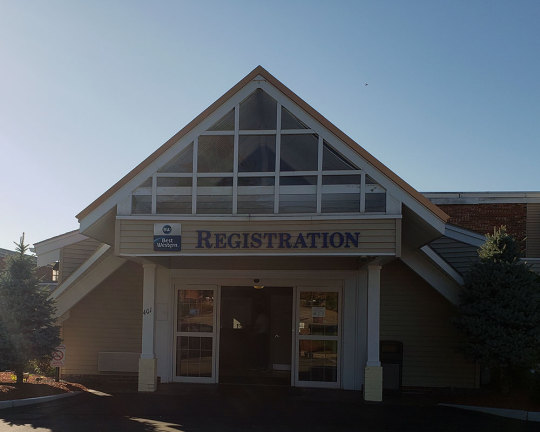
View On WordPress
0 notes
Text
0 notes
Photo

Poolside at a Howard Johnson's Motor Lodge in Austin, Texas. Photographed August 1967 by Hugh Mason Ayer.
#Howard Johnson's#1967#motor lodge#Hugh Mason Ayer#Hojo's#motel#vintage#swimming pool#1960s#Austin#Texas#girl#swimming
494 notes
·
View notes